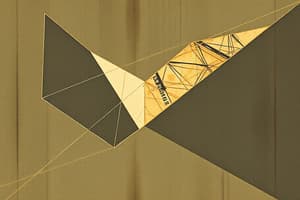Podcast
Questions and Answers
What is the duration of the in-class test for Year 7?
What is the duration of the in-class test for Year 7?
- 50 minutes
- 60 minutes
- 40 minutes (correct)
- 30 minutes
Which tool is NOT required for the math assessment?
Which tool is NOT required for the math assessment?
- Pencil (correct)
- Ruler
- NESA approved calculators
- Non-erasable black pen
On which date will the in-class test be held for class 7MATA?
On which date will the in-class test be held for class 7MATA?
- Friday, 22/11
- Wednesday, 20/11
- Wednesday, 6/11
- Thursday, 21/11 (correct)
What topics will the in-class test cover?
What topics will the in-class test cover?
What is the release date for this assessment task?
What is the release date for this assessment task?
Which teacher will conduct the in-class test for class 7MATH?
Which teacher will conduct the in-class test for class 7MATH?
What is the purpose of the NESA approved calculators during the test?
What is the purpose of the NESA approved calculators during the test?
Which of the following describes the assessment task's content focus best?
Which of the following describes the assessment task's content focus best?
What is the sum of the interior angles of a triangle?
What is the sum of the interior angles of a triangle?
Which pair of angles are considered complementary?
Which pair of angles are considered complementary?
Which type of triangle has all sides of equal length?
Which type of triangle has all sides of equal length?
When two parallel lines are cut by a transversal, what can be said about corresponding angles?
When two parallel lines are cut by a transversal, what can be said about corresponding angles?
Which of the following statements about quadrilaterals is NOT true?
Which of the following statements about quadrilaterals is NOT true?
What is the property of co-interior angles when two parallel lines are cut by a transversal?
What is the property of co-interior angles when two parallel lines are cut by a transversal?
Which classification is not a type of triangle based on its angles?
Which classification is not a type of triangle based on its angles?
Which of the following correctly describes a rectangle?
Which of the following correctly describes a rectangle?
What is the relationship between the exterior angle of a triangle and its interior opposite angles?
What is the relationship between the exterior angle of a triangle and its interior opposite angles?
Which property applies to vertically opposite angles formed by two intersecting lines?
Which property applies to vertically opposite angles formed by two intersecting lines?
Flashcards are hidden until you start studying
Study Notes
### Assessment Task 4
- Assessment Task 4 for Year 7 Mathematics is an in-class test
- The test is worth 40 minutes, with 3 minutes of reading time
- It covers the topics "Angle Relationships" and "Properties of Geometrical Figures"
- Students will need a non-erasable black pen, a ruler, and their NESA approved calculators
### Angle Relationships
- Understand the language, notation, and conventions of geometry
- Identify and label vertices, arms, and angles using capital letters
- Recognize right angles, straight angles, angles of complete revolution, and vertically opposite angles
- Apply the terms complementary and supplementary to pairs of angles
### Properties of Geometrical Figures
- Classify triangles according to their side and angle properties
- Classify and describe different types of triangles: acute-angled, right-angled, obtuse-angled, equilateral, isosceles, and scalene
- Identify and label the properties of special quadrilaterals: squares, rectangles, parallelograms, rhombuses, trapeziums, and kites
- Apply the properties of triangles and quadrilaterals to determine unknown sides and angles
### Specific Content
- Identify pairs of parallel lines using the parallel symbol (||)
- Identify and define transversals
- Recognize corresponding angle pairs, alternate angle pairs, and co-interior angle pairs
- Verify and identify corresponding angles and alternate angles as being equal, and co-interior angles as supplementary
- Apply knowledge of angle relationships to find the sizes of unknown angles
- Prove that the interior angle sum of a triangle is 180°
- Prove that any exterior angle of a triangle equals the sum of the 2 interior opposite angles
- Apply the angle sum of a triangle to prove that the angle sum of a quadrilateral is 360°
- Distinguish between convex and non-convex quadrilaterals
- Understand that some quadrilaterals may be classified as more than one type of quadrilateral
Studying That Suits You
Use AI to generate personalized quizzes and flashcards to suit your learning preferences.




